|
School Castelvì (1), Spano (2) |
 (1) (1)
|
||
|
Function To measure masses. | |||
|
|||
|
Description (1) The balance has two circular brass pans, a wooden frame with the upper flat in marble. The measure is made by comparing the mass of the body and that of the weights. The equilibrium condition is visible in front. | |||
 Menu
Menu
|
School Spano (1), University (2) |
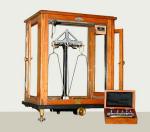
|
||
|
Function For precision measure of masses. | |||
|
|||
|
Description The balance is inside a mahogany glass case with hinged lateral doors and a balanced frontal door. It is provided with a triple stop for the beam, the suspension system and the pans. It has a pneumatic device for the oscillation. The loading of the weight fraction is made from the outside. Hanging load gr. 200, sensibility mg 0.1. | |||
|
School Azuni (1), University (2), Spano (3) |
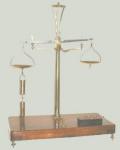 (1) (1)
|
||
|
Function To study the buoyancy. | |||
|
|||
|
Description (1) The balance lies on a wooden basis with four brass feet adjustable in height. The hollow brass column ends with a cradle to contain the beam and the fulcrum of the balance. On the front of the basis stands a lever to block and unblock the beam. The equipment is provided with normal pans and pans with hook besides a double cylinder for the experience of Archimedes. | |||
|
School Castelvì |
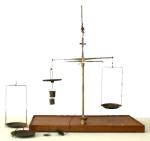
|
||
|
Function To study the buoyant force. | |||
|
|||
|
Description The main support is an iron column fixed on a wooden basis. The beam lies on steel bearings, supported by a column sliding along the iron pole, so that the balance can shift vertically. We obtain the sliding with a string that winds around a reel fixed to the basis on the front of the balance. We can change the height of the beam height with the string through two pulleys. The pans have a hook below for the experiments on the Archimedean principle | |||
|
School Spano |
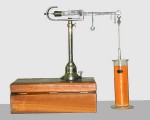
|
||
|
Function To measure the density of a liquid or a solid. | |||
|
|||
|
Description With this type of balance we can measure the density of a liquid. With riders, placed opportunely on the rider scale, we compensate the decrease of the weight of the plummet when it is completely immersed in the liquid. Using a liquid with known density, we can determinate the decrease of the weight of a body immersed in the liquid and consequently the volume of the body. This balance can also be used to determinate the density of the solid bodies. | |||
|
School University (1), Castelvì (2) |
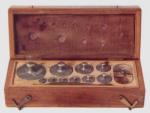 (1) (1)
|
||
|
Function | |||
|
|||
|
Description Cylindrical weights from 1 gr. to 200 gr. | |||
|
School Pellegrini |

| ||
|
Function To measure the forces. | |||
|
|||
|
Description In painted metal, it has a semicircle quadrant and presents two rings and two hooks. | |||
 Menu
Menu
|
School Spano |

|
||
|
Function To measure the forces. | |||
|
|||
|
Description A spring placed inside a metallic cylinder is welded to the closed end. The other end of the spring is welded to a handle. Another handle is welded to the closed end of the cylinder. An index shows the intensity of the applied force. | |||
|
School Azuni |
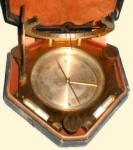
|
||
|
Function Universal sundial for the measure of the time. | |||
|
|||
|
Description It is a mobile sundial set on a brass plate with an inserted compass and its graduated quadrant. | |||
|
School University (1), Castelvì (2) |
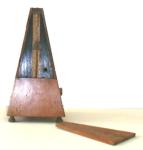 (2) (2)
|
||
|
Function For measuring the time. | |||
|
|||
|
Description Model with vertical pendulum in a wooden case. The functioning is time-clockwork. | |||
|
School Spano |
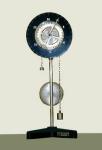
|
||
|
Function It is used to show the functioning of the pendulum clocks and for measuring the time. | |||
|
|||
|
Description The quadrant is graduated in white on black. When the pendulum is regulated to strike the second in a complete oscillation, the model is used to count half seconds. | |||
|
School Spano |

|
||
|
Function To register the number of revolutions of a rotating machine. | |||
|
|||
|
Description The model can be used up to a thousand turns. | |||